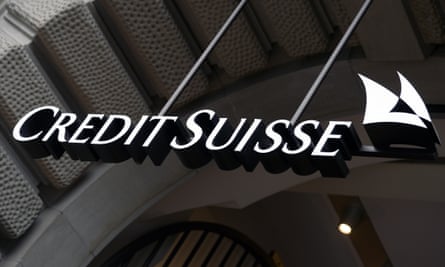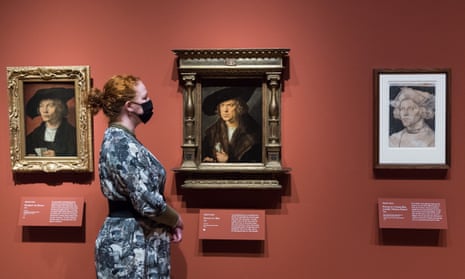The National Gallery’s partnership with Credit Suisse has been thrown into question after leaked documents revealed the hidden wealth of the bank’s criminal clients, including drug traffickers, money launderers and corrupt politicians.
Credit Suisse, headquartered in Zurich, has sponsored the National Gallery since 2008 in one of the UK’s biggest arts funding deals. The partnership, renewed in 2020 and due to run until at least 2024, means Credit Suisse’s name is linked to exhibitions for artists from Raphael and Monet to Michelangelo and Leonardo da Vinci.
But the gallery, which houses more than 2,300 works at its landmark location in London’s Trafalgar Square, is facing scrutiny over the arrangement in light of revelations about its sponsor last week.
The “Swiss secrets” leak involved data relating to 30,000 clients and revealed that Credit Suisse opened or maintained accounts for high-risk individuals, including a human trafficker in the Philippines, a Hong Kong stock-exchange boss jailed for bribery, executives who looted Venezuela’s state oil company, and corrupt politicians from Egypt to Ukraine.
The findings, published by a coalition of news outlets including the Guardian, point to widespread failings of due diligence by Credit Suisse in what is the latest in a string of scandals to embroil the Swiss bank.
Credit Suisse – which says it “strongly rejects the allegations and insinuations” – is currently on trial in Switzerland facing charges that staff failed to stop money laundering by drug traffickers, allegedly involving cash deposited in suitcases. It is defending the charges and denies any wrongdoing.
In October 2021, the UK’s Financial Conduct Authority fined the bank £147m for serious financial crime due diligence failings related to loans worth over $1.3bn, which the bank arranged for Mozambique and the regulator says were “tainted by corruption”.
The National Gallery, a publicly funded body sponsored by the Department for Digital, Culture, Media and Sport, says its partnership with Credit Suisse has provided “vital funding” for its exhibitions and learning programmes, including its work with schoolchildren.

But its ethical sponsorship policy states that it must consider the potential for harm in cases where “the source of a gift or sponsorship is alleged to have participated in illegal activities, including financial crime”.
Tom Keatinge, director of the Centre for Financial Crime and Security Studies at the RUSI (Royal United Services Institute) thinktank, said it was extremely difficult for institutions like the National Gallery, because “on the face of it, Credit Suisse should be an entirely legitimate funder”. But he said the Credit Suisse leaks “point to a more systemic issue in the bank as opposed to just a couple of rogue dudes”.
“At what point do we switch from a few rogue transactions to a rogue bank? That has to be a question that beneficiaries of sponsorship should be thinking about,” he said.
Michelle Wright, the founder of Cause4, a social enterprise that supports charities, and programme director of the Arts Fundraising and Philanthropy programme, said the Credit Suisse partnership had delivered great things but that the National Gallery needed to consider whether it could defend it in light of the recent revelations. “They should be reviewing this because there is now reputational risk to that sponsorship,” she said.
The National Gallery declined to comment on the revelations about Credit Suisse but said its development department, which is in charge of fundraising, adhered to the ethical policy, which it keeps under review.
Credit Suisse declined to comment on the partnership with the gallery. In relation to the leaks, a spokesperson said: “This appears to be a concerted effort to discredit not only the bank but the Swiss financial marketplace, which has undergone significant changes over the last several years.”
“While Credit Suisse cannot comment on potential client relationships, we can confirm that actions, including account closures, have been taken in line with applicable policies and regulatory requirements at the relevant times. Our strategy puts risk management at the very core of our business.”
The controversy comes at a turbulent time for the arts and raises wider questions around ethical funding, with other cultural institutions recently thrust into the spotlight over their links to controversial companies.
Last week, the National Portrait Gallery announced it was cutting ties with the oil giant BP after three decades following years of protests by climate activists. Other organisations, including the Tate and the Royal Shakespeare Company, had already ended their relationships with the firm, while the British Museum continues to receive funding and has announced no plans to change that.
Several institutions have also removed the Sackler family’s name in recent months over members of the family’s role in the opioid crisis that claimed thousands of lives.
Wright said there was “so much risk in this area” for institutions. “The artistic community is very, very sensitive on where money for their art comes from, and many of them are publicly-accessible, so they’re in the public eye,” she said. She called for a “joined-up approach” on polarising issues to ensure the arts sector did not become “too hot to touch” for corporate sponsors. “What happens at the moment is that there’s a spotlight on an individual organisation and frankly, the chief executives of other organisations are wiping their brows and thinking: ‘Thank goodness it’s not us.’ ”
